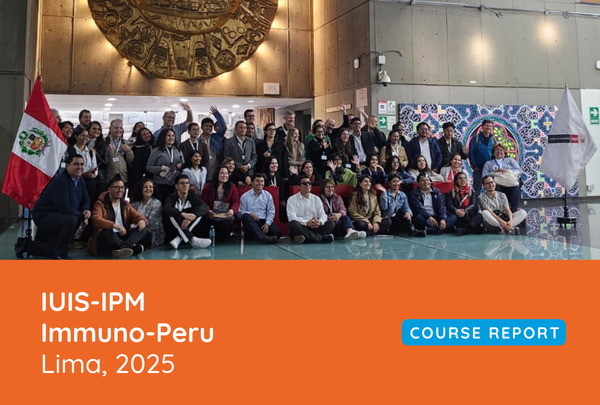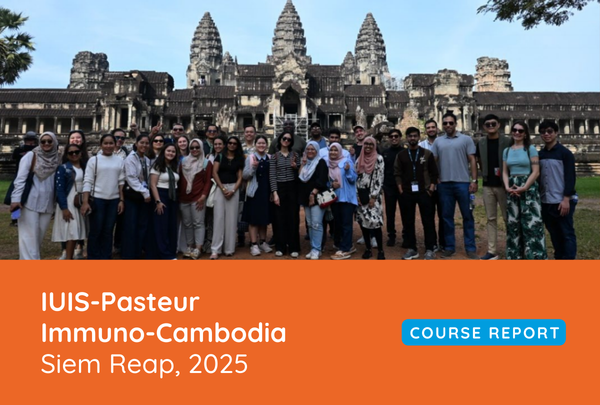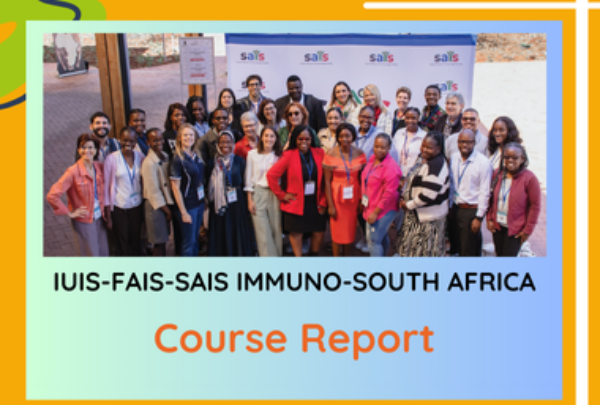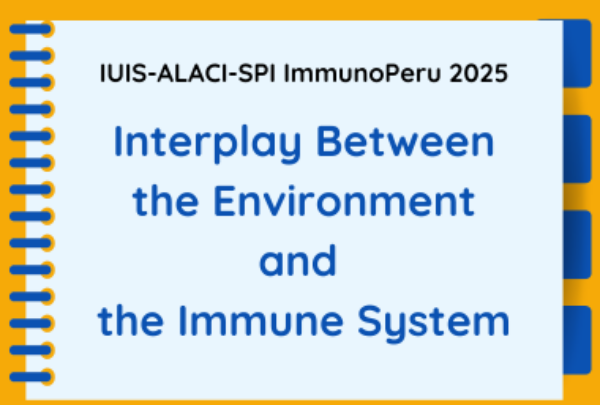The 13th International Course for Clinical Immunology ofInfectiousDiseases (ICCI), EGYPT, Suez Canal University, Ismailia, October 20th to November 27th, 2008
It is organized by Dr Ahmed El-Gohary, President of Fayoum Universityand President of FAIS. The6-week course is mainly sponsored by the Japan InternationalCooperation Agency (JICA).
This course is intended mostly to benefit sub-Sahara participants, whoare working in clinicalimmunology laboratories and trying to do graduate work on a part timebasis. Our support covers thecost of two additional students to attend the course. Students areprovided with current views inImmunology, particularly those relevant to Africa; several hands-onpractical sessions are included.Basic concepts are first discussed followed by more specializedlectures by national and internationalfaculty. Participants are extremely keen and eager to learn, whichmakes for a very interactive group.
AAI Advanced Course: (July 19-24, The University ofMinnesota, Minneapolis)
Camila Leindecker Stumm from Brazil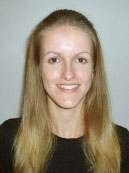 Camila is a PhD student at the Department of Immunology, University ofSao Paulo, Brazil, where she investigates the role of lipid mediatorson the airway remodeling in acute and chronic models of lung allergicinflammation. Her MSc thesis was in celldevelopment during pregnancy and she then decided to do a Doctorate inimmunology because it was a very exciting discipline with a wide rangeof possibilities to build a career. Although she has had no problemsfollowing the graduate courses in Immunology in Brazil, she felt thatattending the AAI Advanced Immunology Course, because of theoutstanding quality of the Faculty, would provide her with a muchdeeper and broader understanding of all aspects of Immunology andbenefit not only her graduate work but also the development of hercareer.
Camila is a PhD student at the Department of Immunology, University ofSao Paulo, Brazil, where she investigates the role of lipid mediatorson the airway remodeling in acute and chronic models of lung allergicinflammation. Her MSc thesis was in celldevelopment during pregnancy and she then decided to do a Doctorate inimmunology because it was a very exciting discipline with a wide rangeof possibilities to build a career. Although she has had no problemsfollowing the graduate courses in Immunology in Brazil, she felt thatattending the AAI Advanced Immunology Course, because of theoutstanding quality of the Faculty, would provide her with a muchdeeper and broader understanding of all aspects of Immunology andbenefit not only her graduate work but also the development of hercareer.
“I would like to thank you immensely for this great opportunity. The course was great; it was very nice to know more about the recent advances in all immunology research fields. The meeting was very well organized and we received all the information and support we needed. Also, I had the opportunity to establish some contacts and to exchange information with other PhD students. I would just like you to know that it was really a great experience for me and I thank you very much for it.”
Sasha Vasilev from Serbia Sasha is a Doctor of Veterinary Medicine (DVM), and has an MScin Veterinary Science. He is currently a Research Associate in theDepartment for Immunology and Immunoparasitology at the Institute forthe Application of Nuclear Energy – (INEP), University of Belgrade,Republic of Serbia. He is also a team member in a National project:”Cellular and molecular mechanisms of immune response andimmune-regulation in parasitized host” (Ministry of Science andEnvironmental Protection, Republic of Serbia, 2006-2010). He activelyparticipates in investigations of fundamental aspects of immuneresponse (follow up studies of particular components of innate and/oradaptive immunity) to T.spiralis. Focus of interest– the role ofT.spiralis in trigerring pro- and anti-apoptotsis mechanisms in thecells of infected host. He also participates in basic and appliedresearch in immunopharmacology, immunology, immunoparasitology,biotechnology. He is a member of the Immunological Society of Serbia –ISS.
Sasha is a Doctor of Veterinary Medicine (DVM), and has an MScin Veterinary Science. He is currently a Research Associate in theDepartment for Immunology and Immunoparasitology at the Institute forthe Application of Nuclear Energy – (INEP), University of Belgrade,Republic of Serbia. He is also a team member in a National project:”Cellular and molecular mechanisms of immune response andimmune-regulation in parasitized host” (Ministry of Science andEnvironmental Protection, Republic of Serbia, 2006-2010). He activelyparticipates in investigations of fundamental aspects of immuneresponse (follow up studies of particular components of innate and/oradaptive immunity) to T.spiralis. Focus of interest– the role ofT.spiralis in trigerring pro- and anti-apoptotsis mechanisms in thecells of infected host. He also participates in basic and appliedresearch in immunopharmacology, immunology, immunoparasitology,biotechnology. He is a member of the Immunological Society of Serbia –ISS.
“I am very grateful to the IUIS Committee on Education and to the AAI Education Committee for the grants and for the opportunity to attend the Advanced Course in Immunology, Minneapolis 2008. As I expected I got a lot in my professional education from the Course. The organisation of the Course was excellent. The lecturers were good, as well as the Lecture Hall. Accommodation – the room in the Radisson University Hotel was very comfortable. Of course, the hotel was really near the Lecture Hall. I liked the Minneapolis University Campus very much. This was my first visit to USA, and I am really very grateful for the opportunity to learn from famous American scientists. The course had great benefit for me. I heard many interesting lectures with the newest advances in immunology. I am very satisfied with the course, organisation, and the trip.Thank you very much again!”
AAI Introductory Course: (June 20-26, 2008;University of Pennsylvania, Philadelphia)
Sheron Dzoro from Zimbabwe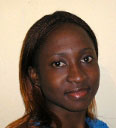 Sheron is 23 years old and obtained an Honours Bachelor of Medical LaboratoryScience Degree in July 2007, at the University of Zimbabwe College of Health Sciences. She is now a Medical Laboratory Scientist, who has been rotating in various laboratories to become familiar with HIV and serology, allergy and autoimmune screens, histopathology, bacteriology. She is interested in a career in Immunology and has been inspired by her mentor Dr Elopy Nimele Sibanda, Clinical Immunologist.
Sheron is 23 years old and obtained an Honours Bachelor of Medical LaboratoryScience Degree in July 2007, at the University of Zimbabwe College of Health Sciences. She is now a Medical Laboratory Scientist, who has been rotating in various laboratories to become familiar with HIV and serology, allergy and autoimmune screens, histopathology, bacteriology. She is interested in a career in Immunology and has been inspired by her mentor Dr Elopy Nimele Sibanda, Clinical Immunologist.
She hopes to build a research-oriented career in Clinical Immunology and Allergology. However, the local College of Health Sciences is currently not offering post-graduate training in Immunology and MSc are more readily available in Microbiology and Clinical Chemistry. The AAI Immunology course was therefore a golden opportunity to enhance her knowledge and enable her to think of research questions suitable for the African settings.
She had an amazing time at the AAI course, which she found intense and of overwhelming depth. But she learned a lot and thoroughly enjoyed it. She is now determined to pursue post-graduate studies in Clinical Immunology and is looking for a PhD Program.
“Thank you so much for all your assistance and concern. I got back home safely with the richness of a wonderful learning experience. I learnt immunology right from the best and latest researchers. The short movies and illustrations presented during the lectures were awesome!! They left very vivid impressions of the efficiency and power of immune cellular action. Throughout the course, I learnt that cell signaling, recognition and regulation are the basics on which any functional immune system hinges, and an upset in any of these will yield potentially severe and aggressive disease states. The class was full of motivated people, with keen interests in one or the other aspect of immune function (or malfunction). There was an excellent immunology environment, one not often available in my own country, where there is very little to no post-graduate immunology. With each presentation, it became more and more evident that the immune system provides the basis from which therapeutic drugs and treatment modalities are derived. Understanding the components and functions of immune surveillance is most crucial and on-going research will answer questions that will improve health-care delivery forever! Failure to recognise self, and loss of tolerance (autoimmunity and hypersensitivity) are my particular areas of interest, and I hope to build a career in these. My most profound gratitude extends to you Michelle, to the AAI and to the IUIS for allowing me the most enjoyable and most memorable learning experience.”
Nicholas Kiulia from Kenya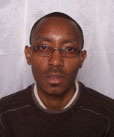 Nicholas is currently working as a Medical LaboratoryTechnologist at the Institute of Primate Research in Kenya and trainedat the Kenya Polytechnic University College in Nairobi. He is also aresearch student, primarily working on the molecular characterizationof selected enteric viruses in human and environmental samples fromKenya, on a collaborative project at the University of Pretoria. Hisfuture plans are to carry out cutting-edge biomedical research tocontribute significantly towards meeting the health requirements, bytesting and disseminating innovations and translating the researchfindings into action. This is one of the set priorities for sustainabledevelopment in response to emerging threats over changing times (e.g.Ebola, Avian Flu, Rotavirus and other emerging infectious pathogens).
Nicholas is currently working as a Medical LaboratoryTechnologist at the Institute of Primate Research in Kenya and trainedat the Kenya Polytechnic University College in Nairobi. He is also aresearch student, primarily working on the molecular characterizationof selected enteric viruses in human and environmental samples fromKenya, on a collaborative project at the University of Pretoria. Hisfuture plans are to carry out cutting-edge biomedical research tocontribute significantly towards meeting the health requirements, bytesting and disseminating innovations and translating the researchfindings into action. This is one of the set priorities for sustainabledevelopment in response to emerging threats over changing times (e.g.Ebola, Avian Flu, Rotavirus and other emerging infectious pathogens).
“The training was an amazing learning experience. During this course I gained insight and in depth understanding in immunology with well and simplified explanations from highly qualified instructors/lecturers that will enable me continue with research in the area of immunology. I am now more focused in research and with these training. I hope to work more and join hands with other immunology researchers towards improving human health. I hope to initiate collaborative research projects with the researchers at the University of Pennsylvania especially in the area of vaccine evaluation, epidemiological assessment of vaccines and vaccine development utilizing the non human primate models.”
Andrea Nora Motter from Argentina Andreais a PhD student at the Instituto de Oncología AngelH. Roffo, in Buenos Aires, Argentina. Her thesis is on: “Theinflammatory tumour microenvironment and immune system as regulators ofbreast cancer development in a murine hormone-dependent model”. Shepreviously worked as a technician for several years and then completedan MSc in 2005.
Andreais a PhD student at the Instituto de Oncología AngelH. Roffo, in Buenos Aires, Argentina. Her thesis is on: “Theinflammatory tumour microenvironment and immune system as regulators ofbreast cancer development in a murine hormone-dependent model”. Shepreviously worked as a technician for several years and then completedan MSc in 2005.
“I am finally back in Buenos Aires after a very enjoyable stay in Philadelphia. I wanted to thank you for such a great opportunity. The course was very interesting and I am sure it will greatly contribute to my work. It was very nice to meet other people taking the course, and the fact that the teachers were researchers made it even more interesting. Also this was my first trip to the US, and I liked it a lot. I will try to apply next year for the advanced course. Please feel free to contact me if you need any other feed back, or if you have any information regarding courses that may contribute to my education.”
Advanced WHO/TDR Refresher Course on Immunology, Vaccinology and Biotechnology Applied to Infectious Diseases, La Paz, Bolivia, 19-30 May 2008
Organized with the collaboration and support of the Swiss Agency for Development and Cooperation [SDC], the Instituto de Servicios de Laboratorio de Diagnóstico e Investigación en Salud (SELADIS), Facultad de Cs. Famacéuticas y Bioquímicas, Universidad Mayor de San Andrés, Institut de Recherche et de Développement [IRD] and IUIS.
This 12th Refresher Course was organized in close collaboration between Dr Pascal Launois of WHO and three participants, Drs K. Terrazas Aranda, J. Calla and S. Zambrana Santander from SELADIS in La Paz, whohad previously participated in a “core” course held in Lausanne. Their dedication and dynamism during the core course in Lausanne, made them the perfect co-organizers of this course.
There were a total of 21 participants. 13 had previously attended acourse in Lausanne and were selected on the basis of their field of interest, excellence and the potential impact of the candidate on its institution strengthening after attending the course. The candidate’s motivation was evaluated by requesting a letter outlining his/her scientific work. In addition, there were 8 participants from Bolivia who had not previously participated in a core course in Lausanne.
Because of the high incidence of tuberculosis in Bolivia, the first day of the course focused on this topic. Basic lectures on Innate immunity, Cytokines, Th1/Th2/Th17 cells, T regulatory cells were also included. The other diseases covered by the course revealed the major public health priorities in the Latin American countries. The diseases were: Leishmaniasis, Malaria, Chagas, HIV and diarrhoeal diseases.
Lectures on quality management in research and on the use of a new platform of resources for scientists from developing countries, called TropIKA, a web site developed by the WHO Special Programme for Research in Tropical Diseases (TDR) were included in the program. A practical session (2 days) was included that focused on measuring immune responses to infectious agents, using intracellular detection of cytokines by FACS analysis. Particular attention was given to the selection of the immunological techniques performed by participants taking into account the feasibility aspects and the limited means available in developing countries.
A two-hour evaluation session of the course was held to openly discuss the results of the previously distributed questionnaire. All the participants were very enthusiastic about the quality of the course and its teaching format. They had learned new teaching methodologies that could be incorporated in their future teaching. Access to information on basic knowledge of immunology and recent technologies used in the fight against infectious diseases is still limited in developing countries. All participants acknowledged that the course was above their expectations and underscored the importance of such refresher courses.
International Vaccinology Course, International Workshop on Adjuvants and Parasite Vaccines 2008 in Varadero, Cuba, 13 to 18th April, 2008
(organized by Dr Oliver Perez, of the Cuban Society forImmunology)
This course was jointly organized with the Latin American Associationof Immunology (ALAI) andsponsored by the Cuban Society for Immunology, ALAI and IUIS.
The course focused on Induction and Mediators of Immune Response, IgA and Mucosal Immunity, Mucosal Vaccines, Adjuvants as essential components of formulations, Current Vaccines, Perspectives in Vaccine Development, Strategy for P. vivax vaccine development in Cali, Columbia, and the importance of Good Laboratory Practices in Preclinical Studies.
Nine investigators well known in the field of Adjuvants and Vaccines were teaching in this course. There was a total of 36 students: 21 from Cuba, 3 from Italy, 3 from UK, 2 from Mexico, and 1 each from Sweden, France, Austria, Lybia, Chile, Venezuela and Brazil. A truly international array of students!
The course was of a high scientific level and promoted the interchange and scientific discussions between students and professors, including a poster session and participation in the workshop itself.
Introductory Course in Immunology in Sudan College of Science & Technology, Al-Neelain University, Khartoum, Sudan, January 5 – 10, 2008
(sponsored by FAIS and IUIS)
Thiscourse was advertised through Sudan, by Mr Amre O.Nasr. 25 applicants were selected on the basis of their involvement in Immunology.
The coursedirector was Dr Samia M.K. Badr. They were 5 researchers, 6 UniversityLecturers, 10 MSc students, 3 PhD students and one teaching assistant.They came from Dongla University (North Sudan), Elgazera University(Central Sudan), Islamic University, Elneel University, TechnicalUniversity, Elneelain University, Tropical Medicine Research Institute,Veterinary Research Centre, Industry Research Centre and The CentralMedical Laboratory.
A copy of the Kuby book of Immunology was given tothe facilitator 6 weeks ahead and to all participants on the first dayof the meeting. Handouts of lectures were also given to the students.
The intent of the course was to teach the basics of Immunology, interms of innate and acquired immunity. The induction of the immuneresponse at the organ, cellular and molecular level was discussed. Thefirst 3 days of the course introduced the basic principles ofImmunology to students with a general biology background. The secondpart of the course was somewhat more advanced and required priorknowledge of basic principles.
At the closing ceremony, the Deanpromised that the college would host a newly formed Society ofImmunology and their future meetings. This was a very important eventin Sudan and perhaps the first such course in Immunology. It was instrumental in the creation of the Sudanese Immunological Society.
